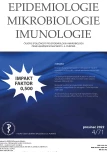Molecular genotyping of Streptococcus agalactiae isolates with non-typeable serotype, Czech Republic, 2008–2020
Authors:
S. Vohrnová 1,2
; J. Kozáková 1
Authors‘ workplace:
Národní referenční laboratoř pro streptokokové nákazy, Oddělení bakteriálních vzdušných nákaz, Centrum epidemiologie, a mikrobiologie, Státní zdravotní ústav, Praha
1; 3. lékařská fakulta Univerzity Karlovy, Praha
2
Published in:
Epidemiol. Mikrobiol. Imunol. 71, 2022, č. 4, s. 203-207
Category:
Short Communication
Overview
The NRL for Streptococcal Infections performed serotyping of 1038 isolates of Streptococcus agalactiae from 972 patients by the latex agglutination method in 2008–2020.
Forty-three isolates (4.4%) whose serotyping failed were classified as non-typeable. The aim of the present study was to determine the genotype of these non-typeable isolates using multiplex polymerase chain reaction (mPCR). Genotyping was successful in the entire set of 43 non-typeable isolates. The most common genotype was V (41.9%), followed by Ia (20.9%). The isolates serotyped by latex agglutination were predominantly assigned to serotype III (29.2%) and V (26.2%). Complete data were obtained on the prevalence of S. agalactiae serotypes/genotypes in the Czech Republic in 2008–2020. Monitoring the serotype and genotype distribution of the pathogen is a prerequisite for the introduction of a potential vaccine against S. agalactiae into clinical practice.
Keywords:
Streptococcus agalactiae – genotype – serotype
Sources
1. Lancefield RC. A Serological Differentiation of Human and Other Groups of Hemolytic Streptococci. The Journal of experimental medicine, 1933;57(4):571–595. doi: 10.1084/jem.57.4.571. PMID: 19870148; PMCID: PMC2132252.
2. Slotved HC, Kong F, Lambertsen L, et al. Serotype IX, a Proposed New Streptococcus agalactiae Serotype. Journal of clinical mikrobiology, 2007;45(9):2929–2936. doi:10.1128/JCM.00117 - 07.
3. Doran KS, Nizet V. Molecular pathogenesis of neonatal group B streptococcal infection: no longer in its infancy. Molecular Microbiology, 2004;54(1):23–31. doi: 10.1111/j.1365 - 2958.2004.04266.x. PMID: 15458402.
4. Cieslewicz MJ, Chaffin D, Glusman G, et al. Structural and genetic diversity of group B streptococcus capsular polysaccharides. Infection and Immunity, 2005;73(5):3096–3103. doi:10.1128/ IAI.73.5.3096-3103.2005.
5. Marques MB, Kasper DL, Pangburn MK, et al. Prevention of C3 deposition by capsular polysaccharide is a virulence mechanism of type III group B streptococci. Infection and Immunity, 1992;60(10):3986–3993. doi: 10.1128/iai.60.10.3986-3993.1992. PMID: 1398910; PMCID: PMC257427.
6. Chaffin DO, Beres SB, Yim HH, et al. The serotype of type Ia and III group B streptococci is determined by the polymerase gene within the polycistronic capsule operon. Journal of Bacteriology, 2000;182(16):4466–4477. doi: 10.1128/JB.182.16.4466 - 4477.2000. PMID: 10913080; PMCID: PMC94618.
7. Rosini R, Campisi E, De Chiara M, et al. Genomic analysis reveals the molecular basis for capsule loss in the group B Streptococcus population. PloS one, 2015;10(5):e0125985. Published 2015 May 6. doi:10.1371/journal.pone.0125985.
8. Ramaswamy SV, Ferrieri P, Flores AE, et al. Molecular characterization of nontypeable group B streptococcus. Journal of clinical mikrobiology, 2006;44(7):2398–2403. doi:10.1128/JCM.02236 - 05.
9. Imperi M, Pataracchia M, Alfarone G, et al. A multiplex PCR assay for the direct identification of the capsular type (Ia to IX) of Streptococcus agalactiae. Journal of Microbiological Methods, 2010;80(2):212–214. doi: 10.1016/j.mimet.2009.11.010. Epub 2009 Dec 1. PMID: 19958797.
10. Slotved HC, Fuursted K, Kavalari ID, et al. Molecular Identification of Invasive Non-typeable Group B Streptococcus Isolates From Denmark (2015 to 2017). Frontiers in cellular and infection mikrobiology, 2021;11 : 571901. Published 2021 Mar 29. doi:10.3389/ fcimb.2021.571901.
Labels
Hygiene and epidemiology Medical virology Clinical microbiologyArticle was published in
Epidemiology, Microbiology, Immunology

2022 Issue 4
-
All articles in this issue
- Carriage of Neisseria meningitidis in newly enlisted young military professionals during the COVID-19 pandemic
- Molecular genotyping of Streptococcus agalactiae isolates with non-typeable serotype, Czech Republic, 2008–2020
- Pečenkovy epidemiologické dny, Plzeň 2022
- 100 let od narození RNDr. Evy Aldové, CSc.
- 100 let od narození doc. MUDr. Josefa Pečenky, DrSc.
- Rejstřík
- Comparing the epidemiological situation of selected sexually transmitted infection in three Czech regions between 2006 and 2013
- Acute kidney injury requiring renal replacement therapy due to Clostridioides difficile infection in a 15-year-old boy
- Epidemiology, Microbiology, Immunology
- Journal archive
- Current issue
- About the journal
Most read in this issue
- Carriage of Neisseria meningitidis in newly enlisted young military professionals during the COVID-19 pandemic
- Acute kidney injury requiring renal replacement therapy due to Clostridioides difficile infection in a 15-year-old boy
- Molecular genotyping of Streptococcus agalactiae isolates with non-typeable serotype, Czech Republic, 2008–2020
- Comparing the epidemiological situation of selected sexually transmitted infection in three Czech regions between 2006 and 2013
